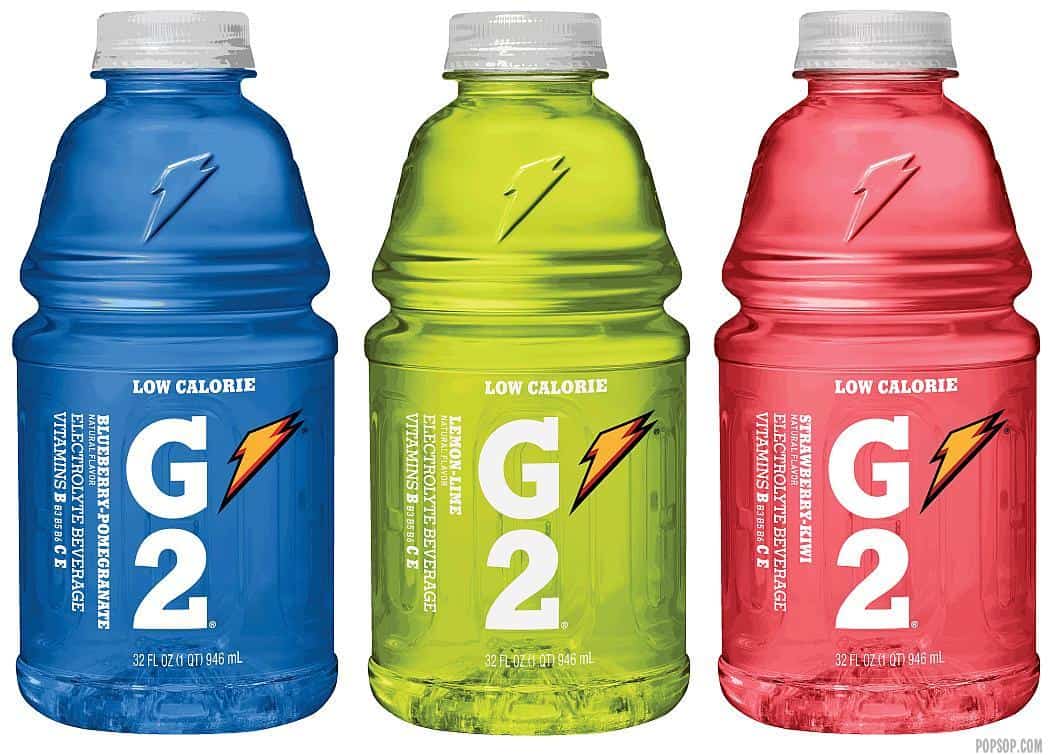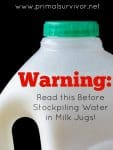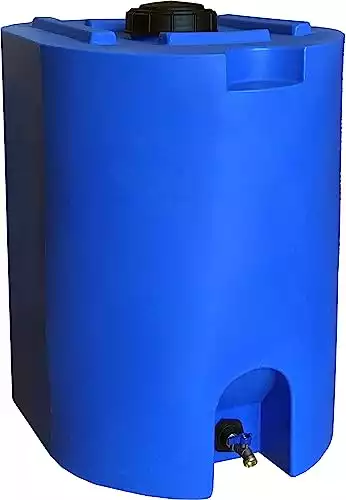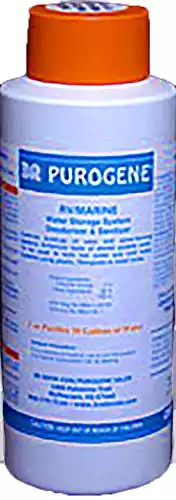One of the best pieces of prepping advice I’ve heard is to stockpile emergency water in milk jugs or other plastic bottles, such as soda…
But, if you don’t dig further, it is also one of the WORST pieces of prepping advice too!
Milk Jugs Are Biodegradable!
As a newbie prepper, I stored my family’s emergency water in gallon milk jugs. The milk jugs went into the pantry and basement and were forgotten…
Until one day when I noticed water all over the floor!
The milk jugs had started LEAKING.
It turns out that those gallon milk jugs are biodegradable. It will take years before they fully degrade, but it doesn’t take long before tiny pin-sized holes develop. Water will leak out of these!
How Long Will Emergency Water Last in a Milk Jug?
In my case, the emergency water in milk jugs didn’t start leaking until about 7 or 8 months. However, I’ve heard stories from preppers whose milk jugs start leaking in as little as 3 months. For others, the milk jugs didn’t start leaking for over a year.
The life of those milk jugs will vary depending on factors like:
- Exposure to light
- Exposure to heat
- Chemicals in the water
- Type of plastic used for the milk jug
I’d say that anything over 6 months is pushing it as far as storing emergency water in milk jugs.
And the Water in Milk Jugs Might Start to Stink!
Here’s another problem about storing water in milk jugs that doesn’t always get mentioned. Since the plastic jugs are permeable, the air from outside will get into the jugs.
Usually, this isn’t such a big deal. However, if you are storing your emergency water jugs in the basement or garage (which is not recommended because of the heat), the musty air will get into your water.
Yes, your emergency water will start to taste like mothballs, dust, and cat litter!
In an actual SHTF situation, you won’t care what your water tastes like – you will just be glad to have it – but drinking crappy-tasting water is not fun and best avoided.
What’s a Better Solution to Milk Jugs for Storing Water?
You should have at least 30 gallons of emergency water stockpiled per person. However, in reality, you will probably need a LOT more than this to survive a major disaster.
Consider that the average American uses about 70-100 gallons of water per day, and you start to realize how inadequate the typical water storage recommendations are.
Read this article on how much water to have on hand.
Even if you go by the lower recommendations of how much emergency water to stockpile, you will still need a lot of containers to store it all.
Option 1: Use Milk Jugs, But Rotate Them
In my family, we don’t drink much soda, juice, or anything else that comes in a plastic bottle. So, milk jugs were the only “free” storage containers we regularly get.
Until we upgraded to water containers (see option 4), we continued using milk jugs to store our emergency water. But we just remembered to rotate through the water every 6 months.
When I say “rotate” the water, I mean you need to GET RID OF THE MILK JUG AND THE WATER INSIDE. It is NOT enough to just dump the water and put new water in the old jug!!!
This also applies if you are gradually rotating through your emergency water, i.e., refilling jugs as you use the water in them. You’ll need to toss all the jugs every 6 months.
Option 2: Buy Bottled Water (NOT recommended!)
A lot of people buy bottled water for their emergency storage. I think this is a terrible waste of money.
Most bottled water is just tap water that has been packaged in plastic bottles. It is expensive and bad for the environment. And…
You still have to rotate bottled water!
Just like how milk jugs are biodegradable, so are plastic water bottles. They will last longer than milk jugs, but eventually, the plastic will start to break down.
This is the reason that store-bought water has an expiration date. The water doesn’t go bad, but the plastic breaks down. You end up with plastic chemicals in your emergency water.
I doubt you will care about BPA in your water during a SHTF emergency – but it is better to avoid this problem.
Plastic water bottles will probably last around 5 years before they start leaking. So, if you don’t mind paying a lot of money for store-bought water and remember to rotate the water yearly, then this is an okay option for water storage.
Read more about how long bottled water lasts.
Option 3: Repurpose Other Plastic Bottles
Milk jugs break down quickly, but other types of plastic can last much longer. Gatorade jugs, for example, are made from a much thicker plastic.
Soda bottles are also thicker and longer-lasting than milk jugs but not nearly as thick as the Gatorade bottles.

Option 4: Buy Water Containers
I think this is the best option for any serious-minded prepper. Yes, those water containers are a pricey initial investment, but they last forever, so it pays off quickly.
Many boating supply stores sell food-grade water containers. These won’t break down. The quality ones (such as the Waterbrick reviewed here.) are BPA-free and won’t leach chemicals into your emergency water.
You can also find them in camping supply stores.
You might also consider getting a large water barrel for storing more water. Just make sure you also get a pump for the water barrel too. Otherwise, getting the water out when you need it will be hard!
I use this 55-gallon emergency water barrel system.
Even with professional water containers, you will still need to rotate your water supply once per year. This is because the water can get “stale.” Bacteria and mold can also grow in it, even if you think you’ve purified the container well.
To make your emergency water last longer (and spare you the hassle of rotating it), you can add a water preserver to your emergency storage.
How do you store your emergency water? Let us know in the comments.





I believe if in doubt bowl the water before you drink it or even use the filtered drinking straws or filtered water pitchers! What’s wrong with that?
The problem isn’t that the water in milk jugs is unsafe. It’s that the milk jugs will spring leaks and you’ll end up with water all over your floor. Water stored in plastic jugs for a long time does start to taste nasty but is usually still safe to drink. Neither boiling nor straw-type water filters will remove bad tastes. Only activated charcoal water filters remove the taste.
If we’re saving water for emergencies, why are we buying Gatorade? Garbage. That money could be put to better use. Just my opinion.
I used about 6 gallon jugs for water storage for hurricane season. Some previously had milk in them and some tea. I had them for 6 months and went to pull them out and one was almost empty.
Any problem with water that has been canned in glass quart jars?
Algae growth shouldn’t be an issue with canned water. So, in theory, canned water could last forever. However, I really don’t recommend storing water (and other emergency supplies) in glass because it breaks so easily. Plus, you’d have to have an insane number of jars to stockpile enough water for even 14 days. Considering all the effort which goes into canning, you are probably better off storing in plastic bottles (ideally good quality ones) and rotating occassionally.
I stored water in plastic milk jugs that was not clean – it came from an irrigation ditch. I lined the walls of my green house with them – just in case the power went out and we did not have access to the well water, as the pump would not work – then we could use this water to flush the toilet. I only stored it for about a year before using it to water plants in the greenhouse. None of them leaked, even in the greenhouse which got hot in summer and the water froze in winter (I did leave a head space for expansion of about an inch).
I have four gallon and a half white vinegar jugs that are pretty thick for about a year now out in the garage. I have put bleach and water in to clean them out I usually let them sit there for a day. Wondering if these jugs are good for storage of water at this time.
If you don’t have the budget for some good-quality water storage containers (they can be very pricy), then those should work well. Just be sure to check on the water twice a year and rotate it occassionally as it will start to taste like plastic over time.
I just looked at the expiration date of the milk jug I’ve been refilling with purified water from a PUR water filter, The milk expired four years ago We’ve never had any troubles.
Had once water in big blue containers designed specifically for holding water for camping. Leaked. Any water storage should be checked from time to time. Fyi if using treated city water, chlorine is already added in most cities. If it is ok to drink, it should be ok to store.
Its a great service to have this material. Thank you!
We have come across some very heavy plastic 5 gallon jugs that previously contained rennin in them in the cheese making process from the cheese factory for $1.50 each. As I understand it there food grade containers and it was a food product That was in them. We were told they should be completely safe for drinking water. Any thoughts?
They should be fine. But don’t be surprised if the water stored in them ends up getting a funky taste. I used some plastic containers which previously had brandy in them for water and the H20 is weird and fruity. I don’t really care since it is just emergency water though.
We don’t drink milk, but when I buy juice, or punch, I save water in those bottles. I feel guilty throwing away substantial plastics. My understanding is a few drops of bleach in the bottle, preserves the water. I really just save for three days, so I keep cases of drinking water, and the other water is for hygiene and if it came all the way down to SHTF, I would boil it.
Just make sure you pay attention to the bottles – they tend to last longer than milk jugs but will still eventually start leaking. 🙁
Right! The couple of drops of bleach are a super cheap alternative.
Rats! I forgot to mention that if you are tasting the mothballs, you are probably drinking the mothballs. The amount may be small, but they are highly toxic. Sounds like we should be careful about where we store our items. Thanks for bringing this up! Again, happy, healthy surviving! Jill
Soda pop bottles, as well as certain other plastic containers, are not supposed to be reused due to the chemicals they will release into your liquids/foods. Research the safety of the particular ones you are considering. Happy, healthy surviving!
I reuse 1 Gal purified water bottles but only the clear plastic (not milk bottle type) and they’ve lasted years. also use 3 gal water cooler type blue plastic. Water filtering/purification has long been an interest of mine. I get my drinking water from RO machines
Good solution but don’t forget to rotate your supplies!
I’ve had my water stored in milk jugs for years no leaks
Just did a search for this because I just found five empty. They’ve been stored for over a year. The rest are still good. It was all of the spring water and the drinking water stayed good but now I think I should probably get something else
Hello Whitney – this is exactly the situation we want to avoid if we ever need to use our stockpile. You could consider looking at some WaterBricks for a more reliable storage solution.
Me too. I do worry about chemicals leaching, since we don’t have a basement, though. We also have three, 55-gallon, food safe barrels, though.